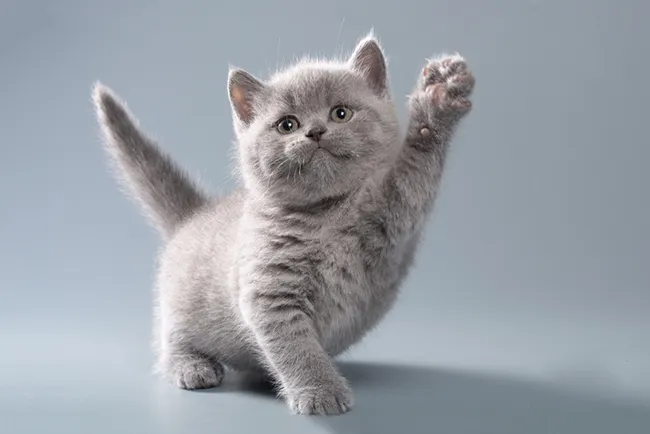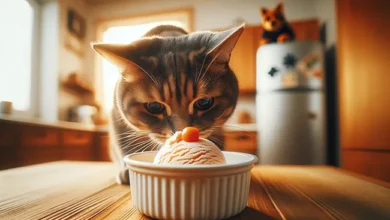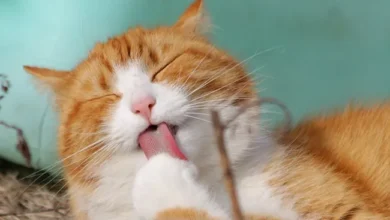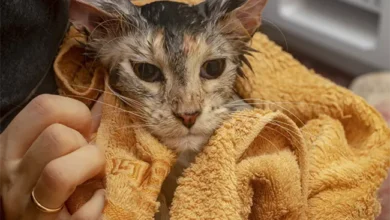
British Shorthair kittens, with their charmingly plush coats and endearingly round faces, encapsulate the essence of feline grace and composure. Renowned for their calm demeanor and sturdy physique, these kittens are the epitome of the classic teddy bear cat – making them a highly sought-after companion for cat enthusiasts around the world. Originating from the United Kingdom, this breed carries a rich history, blending seamlessly into the fabric of many households with their adaptable and affectionate nature. Whether curled up in a cozy corner or playfully engaging with their favorite toys, British Shorthair kittens offer a unique blend of independence and loyalty, making every moment with them a delightful experience. As we delve deeper into the world of these magnificent felines, it becomes clear why British Shorthair kittens are not just pets, but cherished members of the families lucky enough to call them their own.
History of British Shorthairs
The British Shorthair, with its dignified demeanor and plush coat, holds a storied place in the annals of feline history, tracing its lineage back to the domestic cats of ancient Rome. These early ancestors were brought to Britain by Roman legions, tasked with protecting food supplies from rodents. Over centuries, these robust and hardy cats melded into the British countryside, evolving through natural selection into the well-muscled, thick-coated breed we admire today.
The formal recognition and development of the British Shorthair as a breed began in the late 19th century. Harrison Weir, often hailed as the father of the cat fancy, played a pivotal role in its establishment. He admired these British cats for their strength, their calm temperament, and their hunting prowess. In 1871, Weir organized the first ever cat show at the Crystal Palace in London, where British Shorthairs were showcased, marking the beginning of their journey from barn cats to beloved show animals and pets.
However, the two World Wars took a heavy toll on the breed, with their numbers dwindling dangerously low. Post-World War II, breeders faced the challenge of reviving the British Shorthair breed. To do so, they crossbred the remaining British Shorthairs with imported long-haired breeds, Persians, and other domestic cats. While these efforts were successful in preserving the breed, they also led to the introduction of the British Longhair.
Throughout the 20th century, breeders worked diligently to refine the breed’s characteristics, aiming to preserve its robust health, calm temperament, and distinctive appearance. The British Shorthair was officially recognized in the United States by the American Cat Fanciers Association in 1980 and has since gained popularity worldwide.
Today, the British Shorthair is celebrated not only for its striking appearance, characterized by a broad chest, a rounded head, and dense, plush fur, but also for its gentle and easygoing nature. These cats are known for their loyalty and their ability to adapt to various living situations, making them ideal companions. Despite their somewhat reserved nature, they form strong bonds with their human families, showcasing a blend of independence and affection that is uniquely their own.
The history of the British Shorthair is a testament to the breed’s resilience and enduring appeal. From their humble beginnings as rodent controllers to their esteemed status as one of the world’s favorite domesticated breeds, British Shorthairs have woven their way into the hearts and homes of cat lovers across the globe.
Characteristics of British Shorthairs
British Shorthair cats are distinguished by a combination of physical and temperamental characteristics that make them one of the most beloved and recognizable breeds in the cat world. Their well-rounded features, plush coats, and amiable dispositions contribute to their charm and appeal.
Physical Characteristics
- Build: British Shorthairs are medium to large cats with a robust and muscular build, giving them a grounded and sturdy appearance. They possess a broad chest, strong legs, and a well-rounded back, contributing to their overall compact and powerful physique.
- Head and Face: The breed is known for its round face and chubby cheeks, giving it a friendly and somewhat teddy bear-like expression. They have a short, broad nose, round eyes, and small ears with rounded tips, perfectly complementing their round head.
- Eyes: Their large, round eyes are one of their most expressive features. The eyes are typically a deep and vivid copper or gold, although blue and green eyes can also be seen, particularly in cats with specific coat colors like white or colorpoint.
- Coat: The British Shorthair’s coat is one of its defining features – dense, plush, and with a crisp texture that can withstand the elements. The breed boasts a wide variety of coat colors and patterns, including solid, tabby, shaded, bi-color, and the classic British Blue, a rich grey-blue that is often associated with the breed.
- Tail: The tail is thick at the base, tapering slightly to a rounded tip, in proportion with the rest of their sturdy body.
Temperamental Characteristics
- Nature: Known for their calm and composed demeanor, British Shorthairs are the epitome of a laid-back breed. They are not overly demanding of attention, yet they deeply enjoy the company of their human families, often following them from room to room.
- Affection: They show their affection in a reserved manner, preferring to sit beside you rather than on your lap. Their loyalty and affection are profound, making them excellent companions.
- Playfulness: Despite their placid nature, they possess a playful side, especially as kittens. British Shorthairs enjoy interactive play and can be quite curious about their environment.
- Intelligence: They are an intelligent breed, capable of learning tricks and commands. Their smart and observant nature makes them quick learners, though they may choose to participate at their own leisurely pace.
- Adaptability: British Shorthairs adapt well to various living situations, making them suitable for both houses and apartments. They do well with children and other pets, given their tolerant and easygoing nature.
- Vocalization: They are not particularly vocal cats; when they do speak, it’s with a soft and melodious voice, often to greet their owners or request a meal.
In summary, British Shorthairs are a delight to live with, thanks to their combination of physical robustness, gentle demeanor, and undemanding nature. Their striking appearance and amiable personalities have cemented their status as one of the most cherished breeds among cat enthusiasts around the globe.
Selecting Your British Shorthair Kitten
Selecting a British Shorthair kitten is an exciting process, but it requires careful consideration to ensure you find the right furry companion for your family. Here are key factors to consider when choosing a British Shorthair kitten:
Research Reputable Breeders
- Reputation: Look for breeders with a solid reputation for ethical breeding practices. Reputable breeders prioritize the health, well-being, and genetic integrity of their cats. They should be registered with cat fanciers’ associations and willing to provide references from previous buyers.
- Health Screening: Ensure the breeder conducts health screenings and genetic testing on their breeding cats to minimize the risk of inherited diseases. They should provide health records and proof of vaccinations and deworming for the kittens.
- Environment: Visit the breeder’s facility if possible. The environment should be clean, spacious, and well-maintained, with kittens appearing well-socialized, active, and healthy.
Evaluate the Kitten’s Health
- Physical Check: Look for clear eyes, clean ears, and a glossy coat. The kitten should be free from visible signs of infections or parasites.
- Activity Level: Choose a kitten that is playful and curious. A lethargic kitten may be a sign of health issues.
- Socialization: Well-socialized kittens will be more comfortable around people and other animals. Observe how the kitten interacts with its littermates and humans.
Consider Personality
- Match Your Lifestyle: British Shorthairs have a calm and laid-back temperament, but individual personalities vary. Some may be more adventurous or cuddly than others. Consider your household’s activity level and what personality traits would be a good fit.
- Spend Time Together: Spend time interacting with the kittens to gauge their personalities. This can help you identify a kitten whose temperament aligns with your expectations.
Ask the Right Questions
- Parentage: Inquire about the health and temperament of the kitten’s parents. This can give you insight into potential future characteristics of your kitten.
- Diet and Care: Ask about the kitten’s current diet and care routine to ensure a smooth transition to your home. Reputable breeders will provide guidance on feeding, grooming, and initial veterinary care.
Understand the Commitment
- Long-term Commitment: Remember that adopting a kitten is a long-term commitment. British Shorthairs can live for 15 years or more, requiring ongoing love, care, and attention.
- Post-adoption Support: A good breeder will offer support after you take your kitten home. This includes advice on nutrition, health care, and any breed-specific needs.
Choosing the right British Shorthair kitten involves a mix of research, observation, and intuition. By taking the time to select a kitten from a reputable breeder, assessing health and temperament, and understanding the commitment involved, you can ensure a rewarding companionship with your new feline friend.
Caring for Your British Shorthair Kitten
Caring for a British Shorthair kitten involves a blend of love, attention to their physical needs, and ensuring their mental well-being. These kittens are easygoing and adaptable, but like all pets, they thrive with proper care tailored to their specific breed characteristics.
Nutrition
- High-Quality Diet: Feed your kitten a high-quality diet formulated specifically for kittens. British Shorthairs are prone to obesity, so it’s crucial to monitor their food intake and ensure they’re getting the right balance of nutrients. Look for foods that are rich in protein to support their muscular build and energy levels.
- Feeding Schedule: Establish a regular feeding schedule. Kittens typically require three to four meals a day. As they grow, you can adjust their feeding schedule to twice daily.
- Water: Always provide access to fresh, clean water. Proper hydration is essential for their overall health.
Health Care
- Veterinary Visits: Schedule regular check-ups with a veterinarian to ensure your kitten is growing healthily. Initial visits will include vaccinations, parasite control, and a general health assessment.
- Spaying/Neutering: Discuss the best time for spaying or neutering your kitten with your veterinarian. This procedure is beneficial for their health and helps prevent unwanted behaviors.
- Dental Care: British Shorthairs can be prone to dental issues. Introduce teeth brushing early and provide dental health chews to maintain good oral hygiene.
Grooming
- Coat Care: Despite their dense coat, British Shorthairs are relatively low maintenance in the grooming department. Weekly brushing is usually sufficient to remove loose hair and prevent matting. During shedding season, you might need to brush them more frequently.
- Nail Clipping: Regularly check and trim their nails to prevent them from becoming too long, which can lead to discomfort or injury.
- Ear and Eye Cleaning: Clean their ears and eyes periodically with a soft, damp cloth to prevent infections. Always use products recommended by your vet.
Exercise and Play
- Physical Activity: Encourage play with toys that stimulate their hunting instincts. This helps keep them physically fit and mentally stimulated. Remember, British Shorthairs may not be as active as other breeds, but they still need regular exercise to prevent obesity.
- Environmental Enrichment: Provide scratching posts, perches, and safe outdoor access if possible. Environments that encourage climbing, scratching, and exploring can contribute to their physical and emotional well-being.
Socialization and Training
- Early Socialization: Expose your kitten to various people, pets, and environments early on. This helps them become well-adjusted and sociable adults.
- Training: British Shorthairs are intelligent and can learn basic commands, use a litter box, and even perform tricks with patience and positive reinforcement.
Caring for a British Shorthair kitten is a rewarding experience. By providing them with the proper nutrition, health care, grooming, and stimulation, you’ll ensure your furry companion grows into a healthy, happy, and well-behaved cat. With their affectionate nature and easygoing temperament, British Shorthairs make wonderful pets that bring joy and companionship to their human families.
Training and Socializing British Shorthair Kittens
Training and socializing British Shorthair kittens are crucial components of their development, ensuring they grow into well-adjusted, sociable, and obedient adult cats. Despite their laid-back nature, British Shorthairs are intelligent and can benefit significantly from early training and socialization efforts.
Socialization
Socialization is the process of exposing your kitten to a variety of experiences, environments, people, and other animals in a positive manner. This exposure helps them become well-rounded and reduces fear or aggression in unfamiliar situations.
- Start Early: The prime socialization period for kittens is between 2 to 14 weeks of age. During this time, they are most receptive to new experiences.
- Safe Introductions: Gradually introduce your kitten to different people, including children, to help them become comfortable around various individuals. Ensure all interactions are supervised and positive.
- Other Animals: If you have other pets, introduce them slowly and in a controlled environment. Monitor their interactions closely to ensure they are positive and safe.
- New Environments: Expose your kitten to different parts of your home, and if possible, to safe, controlled outdoor spaces. This helps them adapt to various situations and environments.
- Handling: Gently handle your kitten daily, touching their paws, ears, and mouth. This helps them become comfortable with future grooming and veterinary examinations.
Training
British Shorthairs can learn basic commands, appropriate behaviors, and even tricks with the right approach.
- Litter Training: Most kittens instinctively use the litter box. However, you can encourage this behavior by placing them in the litter box after meals and playtime. Keep the litter box clean and in a quiet, accessible location.
- Scratching Post Training: Encourage the use of a scratching post from a young age to prevent unwanted scratching on furniture. Place their paws gently on the post and reward them for using it.
- Command Training: Use positive reinforcement to teach basic commands such as “come,” “sit,” or “stay.” British Shorthairs respond well to treats and praise as rewards for compliance.
- Leash Training: If you plan to take your British Shorthair outdoors, start leash training early. Begin by getting them used to a harness indoors before gradually introducing the leash and outdoor adventures.
Tips for Successful Training and Socialization
- Patience and Consistency: Be patient and consistent in your training and socialization efforts. British Shorthairs may take more time to learn compared to some other breeds, but they are capable learners.
- Positive Reinforcement: Always use positive reinforcement, such as treats and praise, to encourage desired behaviors. Avoid punishment, as it can lead to fear and mistrust.
- Short Sessions: Keep training sessions short and engaging to maintain their interest. British Shorthairs can have short attention spans, especially as kittens.
Training and socializing your British Shorthair kitten lays the foundation for a well-behaved, confident, and happy adult cat. By investing time in these early stages, you’ll enhance the bond between you and your kitten, ensuring a harmonious relationship for years to come.
Enjoying Life with Your British Shorthair
Enjoying life with a British Shorthair is a unique and rewarding experience, thanks to their charming personality, striking appearance, and calm demeanor. These cats are known for their adaptability, making them excellent companions for a wide range of households, from bustling families to quiet singles. Here are some tips to ensure you and your British Shorthair enjoy a fulfilling life together.
Embrace Their Company
British Shorthairs are known for their affectionate yet independent nature. They may not demand constant attention or seek to be lap cats, but they enjoy being in the company of their human family. Embrace their presence by involving them in your daily activities, whether it’s watching TV, reading a book, or working at your desk. Their quiet companionship is comforting and can be a source of stress relief.
Engage in Play
Despite their laid-back nature, British Shorthairs do have playful moments and appreciate interactive playtime. Toys that mimic prey, such as feather wands or laser pointers, can stimulate their hunting instincts and provide much-needed exercise. Regular play sessions not only keep them physically fit but also strengthen the bond between you.
Create a Cat-Friendly Environment
British Shorthairs are curious by nature and appreciate an environment that caters to their exploratory instincts. Consider setting up cat trees, shelves, or window perches to allow them to survey their territory from a high vantage point. Scratching posts and interactive toys can keep them entertained and prevent boredom.
Regular Grooming Sessions
While British Shorthairs are not high-maintenance when it comes to grooming, they do benefit from regular brushing sessions. This not only helps manage shedding but also provides an opportunity for bonding. Use this time to check for any signs of health issues, such as lumps, bumps, or skin problems.
Monitor Their Health
Keeping an eye on your British Shorthair’s health is crucial for enjoying a long life together. Regular veterinary check-ups, vaccinations, and preventive care are essential. Pay attention to their diet to prevent obesity, a common issue in the breed. A healthy British Shorthair is a happy companion.
Respect Their Space
While British Shorthairs are sociable, they also value their space. Ensure they have a quiet, comfortable area where they can retreat and relax away from the hustle and bustle of household activities. This respect for their independence will make the times they choose to interact even more special.
Cherish Every Moment
British Shorthairs are known for their longevity, often living well into their teens with proper care. Cherish every moment with your feline friend, from their playful kitten days to their dignified senior years. Their unwavering loyalty and serene presence make every day spent with a British Shorthair a joy.
Living with a British Shorthair is a delightful experience, filled with moments of quiet companionship, playful antics, and mutual affection. By understanding and catering to their needs, you can ensure a harmonious and loving relationship that enriches both your lives.
Conclusion
Owning a British Shorthair kitten offers a unique blend of joy, companionship, and tranquility that cat lovers cherish. From their plush coats and cherubic faces to their serene and affectionate demeanor, British Shorthairs make ideal pets for families, singles, and seniors alike. By understanding their history, characteristics, and needs—from selecting the right kitten, providing proper care and nutrition, to engaging in training and socialization—you can ensure a happy and healthy life together. Embracing the company of a British Shorthair means welcoming a loyal friend whose calm presence and playful moments will enrich your life in countless ways. With the right care, these charming companions will share your life with love, laughter, and contentment for many years to come.



